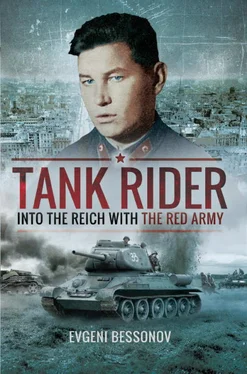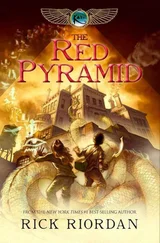FIGHTING ON THE SANDOMIR BRIDGEHEAD

The next day we left that position and quickly moved on tanks to the west, towards the Vistula, where Soviet troops had captured a bridgehead on the western side of the river. We entered Poland.
The march was quiet, we did not participate in any action on the way from Sambor to Sandomir bridgehead. Even the Luftwaffe did not disturb us. We completed our 200 kilometres’ march, reached the Vistula by 15 August and safely crossed the river on a bridge of boats. The German air force constantly bombed the bridge, but at the time when we were crossing, the Luftwaffe was not there. We were lucky.
Our Brigade’s task, as well as task of the entire Tank Army, was to assist the units holding the Sandomir bridgehead. However, the heavy fighting companies of all battalions of the Brigade had suffered significant losses in personnel, and the tank regiment had lost many tanks and other equipment. Our company had fifteen or twenty men left, and other companies did not fare better, some even had less. After crossing the Vistula we advanced into the bridgehead and stopped in a young forest, setting up tents. We did not have anything to go into action with – neither tanks nor soldiers.
Several days later we received insignificant replacement personnel from hospitals and rear units. The men that joined the company were of different ages, most of them were older, the bulk of them had never seen battle, and some of them did not know how to handle a submachine-gun. It was not a nice gift, as the saying goes. But we had to go into battle with them, so we trained them a lot. Chernyshov appeared, on 20 August he took over the company, while I returned to my second platoon. Two companies were formed in the battalion. There were not enough men to form the 3rd company. All in all, we were given no more than a week to form the units.
For the first time at the front they screened a film for us – Two soldiers . However, we did not have a chance to finish watching it - a kukuruznik , or corn plane (this is what we called a U-2 plane) (the name probably comes from the joke that those planes could not fly higher than corn – translator’s comment), flew by, the pilot turned off the engine and shouted to us through loudspeaker: ‘Slavs, turn off the film! The Germans are about to deliver an artillery strike!’ Everyone dispersed very quickly. The pilot was right, after some time the Germans hit the place with artillery fire. We finished watching that film after the war, in the autumn of 1945 in Vesprem, Hungary. They did not show any more movies to us at the front. I rarely saw artists or war correspondents or mobile shops during my time at the front. Just once, in June 1944 when we were at Kopychintsy, an army ensemble came to visit us, that was about it for cultural activities in our 49th Mechanized Brigade. All of a sudden a military shop appeared on Sandomir bridgehead. Once squad leaders, led by Sergeant Pavel Poddubny, walked up to me and asked me if I had money. I gave them some money, but I do not remember how much. I could not have had a lot of money, as my salary was 900 roubles, out of which 700 I sent to my parents through bank transfer, and I had to pay party membership fees and do some other payments, leaving around 100 roubles for myself. So, when the military shop arrived, it turned out that those guys bought a couple of Troinoi (brand name – translator’s note) eau-de-colognes and some other small things. They invited me to their tent and proposed drinking the eau-de-cologne. It would have been nice to have a drink, but my stomach would not take eaude-cologne, and the men drank it themselves.
In late August, about the 26th, the Brigade was transferred to the front sector where the Germans were pressurizing the infantry units of the army. We had to stop the enemy and throw him back to the initial positions. Our battalion, as well as the Brigade in general, was seriously weakened; other units of our army also suffered significant losses, but a tank army is a tank army, it is not a needle in a stack of needles, so our arrival was not left unnoticed by the Germans. The very fact of our arrival deterred the enemy. We were happy that the German air force was almost not present – they either were exhausted or transferred from Sandomir bridgehead to another front sector. However, German artillery was very active instead, and the worst part was that they opened more or less accurate fire with largecalibre shells. However, we successfully camouflaged our positions, made to dig in and did not have losses from that barrage.
On an evening in late August 1944 the company received an order to move to the attack position, closer to the German lines and wait for the order to assault the nearest hill. As far as I remember, another platoon leader in the company was Lieutenant Gavrilov. I led the first platoon, Sergeant Savkin led the second and Gavrilov led the third one. The company that was supposed to have 100 men had not more than 40 soldiers.
I moved the platoon and company forward, ordered them to dig in, appointed observers and we had a chance to ‘listen to the grass growing’ for a couple of hours, that is, to have a nap. At dawn an orderly ran to me from company commander Chernyshov with an order ‘to attack the hill’. We had neither tanks nor artillery support. The Brigade had suffered heavy casualties in tanks, the artillery battalion must have also been hit hard. As often happened at the front, we did not have the slightest idea about the enemy – how strong he was, where the positions were and whether he had tanks.
The sun started to warm us; it was quiet, one could hear only birds singing from the nearest forest, which was not yet occupied by our troops. I replied to the runner that I was about to start the attack; he left, and I again fell asleep. The runner from the company commander ran up again, with the same order and with threats from the company commander. I again replied that we would commence the attack any time soon and fell asleep again – such things had never happened to me before. The runner woke me up and again reminded me of the attack – this time, the company commander ordered him not to leave me before I started the attack. I slept under a bush on soft grass (I did not dig a trench), I had been dreaming about something peaceful and I really did not feel like dying in that quiet hour… I tried to think of death as little as possible, but at that moment I was merely overwhelmed by exhaustion and quietness and I really wanted to sleep.
I feared a German attack from the left, from the forest – we were on the leftmost flank of the battalion, but I had to fulfil the order. I got the company up and we advanced in short rushes. The enemy did not open fire and we advanced some 100 or 150 metres ahead. So far everything was all right and I already had hopes that we would quietly capture the hill without shooting and soldiers dying, but my dreams did not come true.
The enemy opened a storm of rifle and machine-gun fire. A German self-propelled gun, the so-called ‘assault gun’ ( Sturmgeschütz ) with 75 mm barrel, appeared on the hill and opened fire. Soldiers lay down, using all folds of the earth, every little hillock, to hide from the bullets. As I could not find a better place, I also lay down in the shade of a bush, a small creek with steep shores behind me. My soldiers also opened fire on the enemy, but we did not even have heavy machineguns – the machine-gun platoon had ceased to exist a long time before that battle; we only had submachine-guns and light machineguns. The German assault gun opened fire with its main gun even on individual soldiers, and very soon all fire from our side ceased. It did not matter how hard I shouted, soldiers did not shoot – no one wanted to die hit by a 75 mm shell. Apparently, the Germans saw me waving my hands, demanding soldiers to open fire and generally making a show. Next to me, not far away, a soldier was lying and the assault gun went right after us. The shell exploded next to the soldier, he was thrown into the air and dropped dead on the ground. I quickly jumped into the creek, and hid under its bank, bending down. The creek was not deep at all, so I did not even get any water in my long boots. The second shell exploded next to the bank, but it did not get me again, and I quickly ran away and threw myself down behind a tree. I was fine, just with some strong ringing in my head. The assault gun ceased fire and stood peacefully on the hill.
Читать дальше














